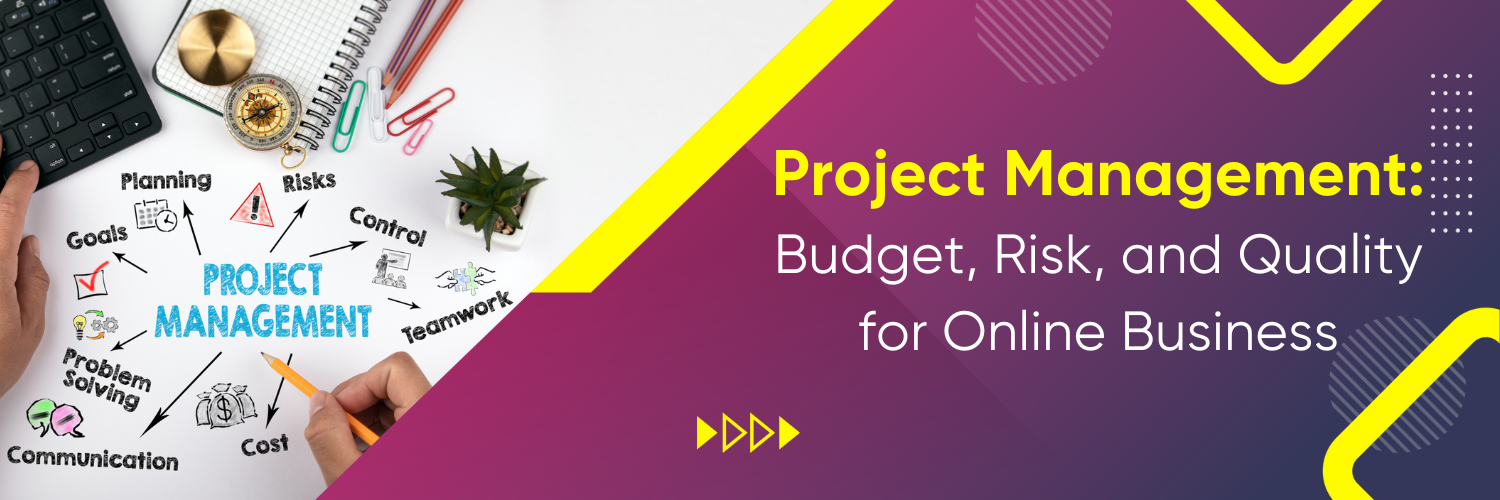Project Management

In today’s digital landscape, project management plays a crucial role in the success of online businesses. It encompasses various areas, including budget management, risk management, and quality management. Each of these aspects is essential for ensuring that projects are executed efficiently and deliver the desired outcomes. Let’s discuss each aspect in detail.
I. Budget Management

A. Definition and significance of budget management in project management
Budget management refers to the process of planning, allocating, and controlling financial resources for a project. It involves identifying all the costs and expenses associated with the project and creating a well-defined budget plan. Effective budget management is crucial for online businesses as it enables them to allocate resources appropriately and ensure that the project remains financially viable.
B. Planning and allocating resources for the project budget
To begin with, it is essential to identify all the costs and expenses involved in the project. This includes direct costs such as equipment, software, and marketing expenses, as well as indirect costs like overheads and labor. Once all the costs have been identified, a budget plan and timeline should be created, outlining how and when the allocated funds will be utilized.
C. Monitoring and controlling the project budget
Monitoring and controlling the project budget is an ongoing process throughout the project lifecycle. It involves tracking expenses and comparing them to the budgeted amounts. This allows project managers to identify any variances and take appropriate actions to address them. Implementing cost-saving measures, such as negotiating better deals with vendors or optimizing resource utilization, can help keep the project within budget.

D. Best practices for effective budget management in online business projects
To ensure effective budget management in online business projects, several best practices should be followed. These include establishing clear financial goals, regularly reviewing and updating the budget, involving stakeholders in the budgeting process, and utilizing project management tools and software to streamline budget tracking and reporting.
II. Risk Management

A. Understanding the concept of risk management in project management
Risk management involves identifying, assessing, and mitigating potential risks that may impact the project’s success. In the context of online business projects, risks can arise from various sources, including technological challenges, market volatility, and cybersecurity threats. It is crucial to proactively manage these risks to minimize their negative impact.
B. Identifying and assessing risks in online business projects
The first step in risk management is identifying potential risks. This includes both internal risks, such as resource constraints or lack of expertise, and external risks, such as changes in market trends or legal regulations. Once identified, risks should be assessed based on their potential impact and likelihood of occurrence.
C. Developing risk mitigation strategies
After assessing the risks, appropriate risk mitigation strategies should be developed. These strategies can include risk avoidance (eliminating the risk), risk transfer (shifting the risk to another party through contracts or insurance), risk reduction (implementing measures to minimize the probability or impact of the risk), or risk acceptance (acknowledging the risk and preparing contingency plans).

D. Continuous monitoring and evaluation of risks
Risk management is not a one-time activity but an ongoing process. Regular risk assessments should be conducted throughout the project to identify new risks or changes in the existing ones. It is important to adjust risk management strategies as needed to ensure that the project remains on track.
III. Quality Management

A. Defining quality management in online business projects
Quality management in online business projects refers to the processes and activities that ensure the project’s deliverables meet the specified requirements and standards. It involves establishing quality objectives, defining metrics to measure project performance, implementing quality assurance processes, and continuously improving project quality.

B. Establishing quality objectives and metrics
To achieve project quality, clear objectives should be set, outlining the expected level of quality for the project deliverables. These objectives should be specific, measurable, attainable, relevant, and time-bound (SMART). Additionally, quality metrics and indicators should be defined to measure the project’s performance against the established objectives. These metrics could include customer satisfaction ratings, defect rates, adherence to project specifications, and overall product or service performance.
C. Implementing quality assurance processes
Quality assurance processes are implemented to ensure that the project’s deliverables meet the defined quality standards. This involves conducting quality control checks and inspections at various stages of the project to identify and address any deviations or defects. Testing and validation procedures should be carried out to verify that the project’s outputs meet the intended requirements and functionality. Quality audits can also be performed to assess compliance with quality standards and best practices.

D. Continuous improvement and feedback loops
To achieve continuous improvement in project quality, feedback loops should be established. This includes monitoring customer satisfaction and obtaining feedback on the project’s deliverables and overall experience. Feedback can be collected through surveys, user testing, or direct communication with stakeholders. The gathered feedback should be analyzed and used to identify areas for improvement and implement corrective actions. By incorporating feedback into future projects, online businesses can enhance the quality of their deliverables and exceed customer expectations.
Conclusion

Effective project management is crucial for the success of online businesses. Budget management ensures that financial resources are allocated appropriately, allowing projects to stay on track financially. Risk management helps identify and mitigate potential risks, minimizing their impact on project outcomes. Quality management ensures that project deliverables meet the defined objectives and satisfy customer requirements. By paying close attention to budget, risk, and quality, online businesses can improve project outcomes, enhance customer satisfaction, and drive long-term success.
In conclusion, mastering project management aspects such as budgeting, risk assessment, and quality control is pivotal to the success of your online business. Ubique Digital Solutions offers expertise in these areas, providing tools and strategies that not only streamline your operations but also propel your business to new heights. The digital landscape is teeming with opportunities, and with Ubique, you can leverage these to your advantage. So don’t just navigate the complexities of online business project management on your own. Follow and partner with Ubique Digital Solutions today and together, let’s chart your path to business success. Act now, because, in this fast-paced digital world, the future belongs to those who are ready to seize it.
FAQs
Q: What is the role of budget management in online business projects?
Budget management plays a critical role in online business projects by ensuring that financial resources are allocated effectively. It helps in planning and tracking project expenses, avoiding cost overruns, and optimizing resource utilization. By managing the budget efficiently, online businesses can maintain financial stability and make informed decisions throughout the project lifecycle.
Q: How can I identify and assess risks in my online business project?
To identify and assess risks in an online business project, start by conducting a comprehensive analysis of the project’s internal and external factors. Engage stakeholders and subject matter experts to gather insights and identify potential risks. Once risks are identified, assess their potential impact and likelihood of occurrence. This assessment helps prioritize risks and develop appropriate mitigation strategies.
Q: What are some common quality objectives for online business projects?
Common quality objectives for online business projects may include delivering products or services that meet or exceed customer expectations, ensuring a seamless user experience, maintaining high data security and privacy standards, and adhering to industry-specific quality regulations. The specific quality objectives may vary depending on the nature of the project and the industry in which the online business operates.
Q: How do I ensure continuous improvement in project quality?
Continuous improvement in project quality can be achieved by establishing feedback loops and incorporating feedback from stakeholders and customers. Regularly monitor customer satisfaction, conduct post-project reviews, and collect feedback on project deliverables. Analyze the feedback received and identify areas for improvement. Implement corrective actions based on the feedback to enhance project quality in future endeavors.
Q: What are the consequences of poor project management in online businesses?
Poor project management in online businesses can lead to various negative consequences. These may include exceeding the project budget, missing deadlines, poor quality deliverables, dissatisfied customers, strained relationships with stakeholders, and a negative impact on the business’s reputation. Additionally, poor project management can hinder future growth opportunities and affect overall profitability.












